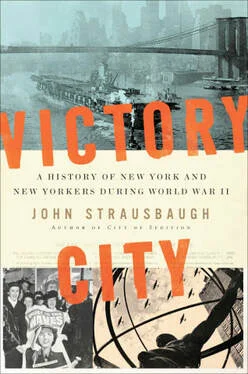John Strausbaugh's Victory City: A History of New York and New Yorkers During World War II
Reviewed by Steven H. Jaffe
In recent years writers and historians have turned their attention to New York City’s experience in World War II. Contributions to the field have included Lorraine B. Diehl’s Over Here! New York City During World War II (2010), Richard Goldstein’s Helluva Town: The Story of New York City During World War II (2010), my own New York at War: Four Centuries of Combat, Fear, and Intrigue in Gotham (2012), and Kenneth T. Jackson’s WWII & NYC(2012), the latter accompanying an exhibition of the same name at the New-York Historical Society. Other scholars have tackled specific aspects of the story, including the crucial military role of the city’s port (over 3 million GIs and 63 million tons of materiel departed from the harbor’s piers to the North African and European fronts), and the volatile political, ethnic, religious, and economic tensions that vexed relations between New York’s Jewish, German, Irish, Italian, and African-American communities before and during the war.
Read More








